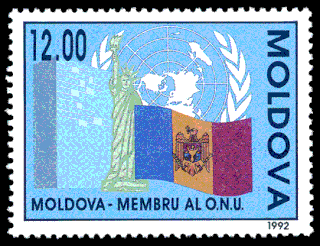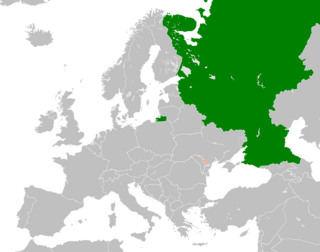
The politics of Moldova take place in a framework of a parliamentary representative democratic republic, wherein the prime minister is the head of the Government of Moldova, and a multi-party system. The President of Moldova has no important powers. The government exercises executive power while the legislative power is vested in the Parliament. The judiciary is independent of the executive and the legislature. The position of the breakaway region of Transnistria, relations with Romania and with Russia, and integration into the EU dominate political discussions.

Transnistria, officially known as the Pridnestrovian Moldavian Republic (PMR), is a breakaway state internationally recognized as part of Moldova. Transnistria controls most of the narrow strip of land between the Dniester river and the Moldova–Ukraine border, as well as some land on the other side of the river's bank. Its capital and largest city is Tiraspol. Transnistria is officially designated by the Republic of Moldova as the Administrative-Territorial Units of the Left Bank of the Dniester or as Stînga Nistrului.

The Union State, or Union State of Russia and Belarus, is a supranational union consisting of Belarus and Russia, with the stated aim of deepening the relationship between the two states through integration in economic and defence policy. Originally, the Union State aimed to create a confederation; however, both countries currently retain their independence.

Dmitry Nikolayevich Kozak is a Russian politician who has served as the Deputy Kremlin Chief of Staff since 24 January 2020. He previously served as the Deputy Prime Minister of Russia from 2008 to 2020. He has the federal state civilian service rank of 1st class Active State Councillor of the Russian Federation.

The Transnistria conflict is an ongoing frozen conflict between Moldova and the unrecognized state of Transnistria. Its most active phase was the Transnistria War. There have been several attempts to resolve the conflict, although none have been successful. The conflict may be considered as having started on 2 September 1990, when Transnistria made a formal sovereignty declaration from Moldova.
The 2006 Transnistrian customs crisis started on March 3, 2006, when Ukraine imposed new customs regulations on its border with Moldova on the Transnistrian region by declaring that it will only import goods from Transnistria with documents processed by Moldovan customs offices, as part of the implementation of a joint customs protocol between Ukraine and Moldova on December 30, 2005.

This is the history of Transnistria, officially the Pridnestrovian Moldavian Republic (PMR), an unrecognised breakaway state that is internationally recognised as part of Moldova. Transnistria controls most of the narrow strip of land between the Dniester river and the Moldovan–Ukrainian border, as well as some land on the other side of the river's bank.
The 1997 Moscow memorandum, also known as the Primakov memorandum, was an agreement governing relations between Moldova and Transnistria aimed at solving the Transnistria conflict.

Roman Ivanovich Khudyakov is a Transnistrian-born Russian politician. On 1 August 2006 he was elected chairman of the Liberal Democratic Party of Transnistria at the party's founding congress.

Law enforcement in Transnistria is administered by the region's own police force. Transnistria functions as a presidential republic, with its own government, parliament, military, paramilitary and police (militsiya) force, constitution, currency, postal system and stamps, flag, national anthem, and coat of arms.

Moldova–Russia relations are the bilateral relations between the Republic of Moldova and the Russian Federation, two Eastern European, post-Soviet, ex-communist countries. Russian support for the self-proclaimed Pridnestrovian Moldavian Republic (Transnistria) and a substantial Russian military presence therein strained Moldovan relations with Russia.

The following is timeline of the History of independent Moldova which started after the independence of Moldova.
Events in the year 2014 in Transnistria.

Moldova–Transnistria relations are the political and economic relations between the Republic of Moldova and Transnistria, an unrecognized state between the Dniester River and Ukraine. During the dissolution of the Soviet Union, political tensions in the Moldavian Soviet Socialist Republic led to Transnistria declaring independence from Moldova, culminating in the Transnistrian War of 1992. As part of the ceasefire agreement ending the war, a Joint Control Commission composed of Moldovan, Transnistrian, and Russian forces was established to supervise the demilitarized zone which was located in the Transnistrian region. The Joint Control Commission still supervises the zone, and negotiations to resolve the dispute are ongoing. The negotiations are supported by the Russian Federation, Ukraine, the United States, the European Union, and the Organization for Security and Co-operation in Europe (OSCE).

Russia–Transnistria relations are the bilateral relations between the Pridnestrovian Moldavian Republic (Transnistria), an unrecognised breakaway state that is internationally recognised as part of Moldova, and the Russian Federation. Russia does not officially recognise the independence of Transnistria; nevertheless, Russia maintains special relations with Transnistria in the political, military, cultural, and economic spheres.

The government of Transnistria, a breakaway state internationally recognized as part of Moldova, has requested annexation by Russia numerous times. Transnistria is a territory that separated itself from Moldova due to fear of a possible unification of the latter with Romania. This sparked the Transnistria War, in which Russian-backed Transnistria managed to stay separate from Moldova. Despite this, today Transnistria is legally and internationally considered part of Moldova.

The 5+2 format, also known as the 5+2 talks, the 5+2 negotiations and the 5+2 process, is a diplomatic negotiation platform aimed at finding a solution to the Transnistria conflict between Moldova and the unrecognized state of Transnistria. It is composed of the latter two, which are designated as "parties to the conflict", and Russia, Ukraine and the Organization for Security and Co-operation in Europe (OSCE), "mediators" of the negotiations. The European Union (EU) and the United States act as "observers". The inclusion of Romania into the 5+2 format has been proposed.
The Cobasna ammunition depot, formally the 1411th Artillery Ammunition Depot, is a large ammunition depot located in the village of Cobasna. Legally and internationally recognized as part of Moldova as a whole, the unrecognized breakaway state of Transnistria controls the village and the ammunition depot and has denied access to international observers, an exception being the Russian military forces located in the region ever since the end of the Transnistria War in 1992. Outside access to the ammunition depot is effectively prohibited. Only the Russian and Transnistrian authorities have detailed information regarding the amount and situation of the stored weapons.

Since the outbreak of the Transnistria conflict, there have been efforts and proposals to reincorporate the unrecognized state of Transnistria into Moldova.
The Yushchenko Plan, also referred to as the Ukrainian Plan, was a unsuccessful 2005 plan developed by then-President of Ukraine Viktor Yushchenko and Secretary of the National Security and Defense Council Petro Poroshenko in an effort to bring an end to the Transnistria conflict by peaceful means with the support of Moldova and the Organization for Security and Co-operation in Europe (OSCE).














